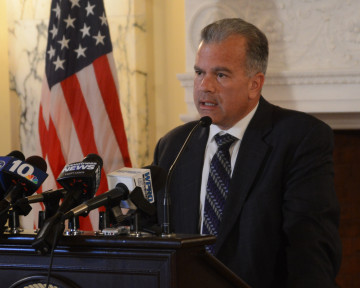Who is Responsible for RI’s Economic Recovery - Trump or Raimondo?
Friday, May 11, 2018
Who is responsible for the condition of the Rhode Island economy? Is the closing of the budget shortfall due to Rhode Island economic policies driven by Governor Gina Raimondo or is it due to a windfall from the federal tax reform legislation pushed through by President Donald Trump?
It is six months before the Rhode Island election for governor and the mid-term election for Congress and the credit and blame game is now being played out before our eyes.
As Speaker of the House Nick Mattiello exclusively told GoLocal on Thursday during an interview at the State House on GoLocal LIVE, the projected budget shortfalls over this and next fiscal years are expected to improve according to the revenue estimating conference. Instead of $250 million shortfalls, the numbers look to be closer to $130 million ahead of projections, from the state's May revenue estimating conference.
GET THE LATEST BREAKING NEWS HERE -- SIGN UP FOR GOLOCAL FREE DAILY EBLASTMattiello told GoLocal that $40 million can be directly attributed to tax reform, but warned that those dollars may be one-time.
Experts Weigh In
“Does Rhode Island really have a low unemployment, high-performing economy? While these two things are not unrelated, when dealing with Rhode Island's economy, things are never as simple as they first appear. I would only agree to the assertion that we have a high-performing economy if two critical words are added: for us. It is true that Rhode Island is doing the best it has in a long time,” said URI economist Len Lardaro.
“However, the statistics [that] persons here rely far too much on, most notably our unemployment rate, have not really improved as much as they appear. The dramatic decline in our unemployment rate has largely been the result of a prolonged downtrend in our state's labor force, as far too many unemployed Rhode Islanders have dropped of the labor force, as evidenced by the fact that our labor force participation rate, the percentage of the population in the labor force, is well below its prior peak,” said Lardaro.
But one of Raimondo’s challengers is even less gracious on the performance of the economy.
"The fact is Governor Raimondo’s lackluster economy lagged far behind the national average GDP growth in 2017 (1.6% to 2.3%). The national economy is improving and our Governor is doing everything she can to stop it from benefiting our state. For example, it's obvious that RI companies have gotten a huge boost from the national tax reforms that Raimondo ardently opposes. CVS stated they were able to raise their base wage & create a new parental leave program. Citizens Bank was able to provide $1,000 bonuses and provide $10 million more in charitable contributions. Washington Trust was able to give bonuses and raise wages for 40% of its workforce,” said Andrew Augustus, spokesperson for GOP hopeful, Cranston Mayor Allan Fung.
Neighboring States
Look north or look west — you get two economies that are different than Rhode Island’s. Massachusetts is a boon to our economy with tens of thousands commuting into the massive Boston metro area for employment each day.
“Then there's our good luck of being located next to Massachusetts, where many Rhode Islanders have been able to find jobs. And, of course, we can't overlook national economic strength,” added Lardaro.
Top urban analyist Aaron Renn says, “The economy has continued to grow, but still at a rate below 3%. There's still a lot of recovery to be done across America, but the trend is encouraging. The control of any individual over the macroeconomy is limited, but whoever is in office gets the credit or blame. So both Trump and Raimondo will both be taking credit. Trump has in fact been moving aggressively on changes to taxes and regulation. And Rhode Island is on a better trend than Connecticut, which has run into a patch of serious problems with its economic competitiveness and budget.”
The employment rate is the key measure
“What persons here should be focusing on is our employment rate - the percentage of our working-age population that is employed. This remains well below where it was at our last peak (as does our labor force participation rate). Furthermore, it took Rhode Island over eleven years to finally reach its prior employment peak, and much of that feat is attributable to the fact that part-time jobs have played a major role in defining our job gains over the past decade. Nobody in their right mind can ever accuse Rhode Island of being a job creation machine!,” said Lardaro.
Still Problems - Clock Ticking
While many measures are improving over the "great recession of 2007," there are many areas in need of stabilization and improvement.
"Think about all of this: Rhode Island's economy appears to be well above where it was in December of 2006, but upon more careful examination of several key statistics, we remain stubbornly below those levels on a host of key statistics, such as resident employment, our employment rate, the labor force participation rate. Clearly, for Rhode Island, this has been and continues to be a very uneven recovery," said Lardaro.
"In spite of the seemingly strong statistics that always end up being cited, the sad fact is that many of our residents continue to be left behind. Worse yet, Rhode Island has done absolutely nothing to end its status of being FILO – first in, last out of national economic weakness. The clock is ticking: Rhode Island has twelve to eighteen months less than the national economy before it falls into its next recession. Instead of continually celebrating the same misleading statistics, our elected officials should have been focusing on an accurate picture of our entire economy, making it stronger, increasing our competitiveness and making us more resistant to national economic weakness," Lardaro adds.
But Fung's camp says that critical dollars have been spent in the wrong places -- too much focus on out of state companies and big subsidies.
“When government gets out of the way, we see true economic growth. Instead of failed corporate welfare efforts of the Governor, such as the nearly $80,000 per job for Johnson & Johnson’s sweetheart deal, Rhode Island needs to make fundamental changes to the way it does business. Governor Raimondo continues to spend our hard-earned tax dollars on Commerce RI incentives for apartments in Providence that don’t really create many full-time permanent jobs,” added Augustus.
Related Articles
- RI GOP Files Federal Elections Complaint Over Raimondo-Providence Dems Fundraising Agreement
- Raimondo Announces 4th Annual Governor for a Day Essay Contest
- RI Loses 200 Jobs in January, Fung Blasts Raimondo’s Performance
- VIDEO: Raimondo on State of RI Roads in Tuesday’s Storm
- Raimondo Says Armed School Resource Officers Should Be Determined by Communities
- Raimondo Invested in Funds That Owned Gun Company Stocks While Treasurer
- VIDEO: Raimondo Doubles-Down on Denying Gun-Lobby Money, Despite Repeated Donations
- Raimondo Refuses to Return Campaign Donations from Gun Lobbyist
- EDITORIAL: Raimondo Denial of Ties to NRA Money - “We Call BS”
- 65% of RIers Support Raimondo’s $250M Bond, Says Bryant’s Hassenfeld Institute Poll
- NEW: RI GOP Blasts Ethics Commission for “Making Excuses for Raimondo”
- Raimondo Criticizes National Grid Storm Response, Company Responds
- Raimondo’s Proposed $18M Developmental Disabilities Cut Draws Rebuke from Trudeau Center’s Sullivan
- Raimondo Picks & Chooses Jobs Numbers - Claims Improvement As RI Loses 500 Jobs
- RI’s Top Early Education Ranking & School Construction Needs: Raimondo Staffer Gallagher on LIVE
- UPDATED: Save The Bay Files Complaint Against Raimondo on CRMC Appointees
- Raimondo Raised a Record $1.3 million in Q1
- Raimondo Has Strong Connection to Key Judge in Trump-Cohen Case
- POLL: Raimondo is the 7th Least Popular Governor in America — 50% Disapprove
- Raimondo’s Proposed Medicaid Cuts Would be Devastating, Says Neighborhood Health Plan’s Marino
- Elder Home Care Advocate Blasts Raimondo on Budget Cuts
- Raimondo’s Proposed Level-Funding of DCYF Not Adequate, Says Children’s Friend CEO
- Governor Raimondo Joins GoLocal LIVE in Newport to Talk Volvo Ocean Race





